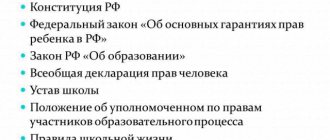Article on the topic: Divorce, Disputes about children
Disputes that arise between former spouses during the divorce process and after the dissolution of marriage are resolved in court. Unfortunately, often one of the parents has to defend the rights of the child that were infringed by the other parent during a divorce. To legally resolve issues related to the property rights of children upon divorce, contact a family law attorney. He will advise you on all issues of interest, and, if necessary, represent your interests in court.
Respect for children's rights during divorce
Many people know that when determining the place of residence or when changing the surname of children, the court is obliged to take into account the opinion of the child if he has already reached 10 years of age. But parents, during a divorce involving the division of land, apartments, cars and other property, often forget about the property rights of each child. And there are also unscrupulous citizens who, taking advantage of the legal illiteracy of their former spouse, infringe upon the property rights of not only the spouse, but also the child during a divorce. To ensure that your child’s rights are not violated, consult with a family law lawyer, because the legislation in this area is not perfect enough.
Common property of children and parents
Community property between parents and children is property that belongs to both the spouses and the offspring.
There are two types of common property: shared and joint. In the latter case, privatization is carried out without indicating the shares of the owners. Shared ownership implies the division of property during privatization into equal shares that belong to the co-owners.
The social status of the child does not affect the ability to own common property.
Property rights of children
The property rights of minors are regulated by Article 60 of the Family Code of the Russian Federation. According to it, the child has the right to receive maintenance from his parents, in the manner and amount established by Section 5 of the Family Code of the Russian Federation. Moreover, the amount and order of maintenance does not depend on whether the parents are legally husband and wife or not.
The amounts due to the child (alimony, pensions, benefits) are at the disposal of the parent (or person replacing him) with whom the child lives. The money should be spent only on the needs of the child.
With regard to the right to housing, the child, according to the law, must be registered at the place of residence of one of the parents. He is a family member and therefore enjoys the same rights to the premises as anyone else registered at that address. But, according to paragraph 4 of Article 60 of the Family Code, the child has no right to the parents’ property. Children and parents who live together must use each other's property only by mutual consent.
Amendments to the UK - providing parents with suitable living quarters for their children
A federal law has been signed on changes relating to providing parents with suitable living quarters for their children. You already know about these changes from the yellow media, and all Russian media are yellow. I read: “Putin signed a law on children’s right to housing after their parents’ divorce.” https://news.mail.ru/society/40492014/ Again we refute the fakes. However, the changes are very important. In accordance with the law signed by the President (No. 10-FZ) https://publication.pravo.gov.ru/Document/View/0001202002060036?index=0&rangeSize=1 amendments are made to the text of Art. 86 of the Family Code (SC). The law will come into force 10 days after official publication. Art. 86 of the Family Code establishes the institution of extraordinary, in relation to regular obligations to provide maintenance (“alimony”), property encumbrances of parents in favor of children. It addresses exceptional circumstances where a parent may be subject to additional costs. Here is this norm in the current edition: https://www.consultant.ru/document/cons_doc_LAW_8982/5e267c47e7ab0f1090e78ae91bd85809a7fcf791/ It is natural that now the costs of providing a child with housing are considered exceptional circumstances if he does not have the opportunity to live in a residential building suitable for permanent residence indoors. There is nothing surprising here, but it is important to understand what place this novelty is aimed at in the system of current regulation. If the parents' family relations are terminated, the child's housing rights to the residential premises where he lives are not subject to termination in any case. If we are talking about housing that belongs to a parent on the right of ownership, then the rights of the child form an exception from the general rule of the loss of the right to use residential premises by a family member in the context of the rules of Part 4 of Article 31 of the Housing Code of the Russian Federation due to the legal position, first in the “Review of Legislation and Judicial Practice of the Supreme Court of the Russian Federation for the third quarter of 2007" (approved by the Resolution of the Presidium of the Supreme Court of the Russian Federation dated November 7, 2007) https://www.consultant.ru/document/cons_doc_LAW_72781/0ff006ae983d22cc178bd92b38fa37ec684b7b05/ and then in paragraph 14 of the Resolution of the Plenum of the Supreme Court and the Russian Federation from 07/02/2009 N 14 “On some issues that have arisen in judicial practice when applying the Housing Code of the Russian Federation.” https://www.consultant.ru/document/cons_doc_LAW_89120/06a45105b085227b81de9c834ba85af51bf67976/ This position is based on the general principles of family law, with which such an interpretation of Part 4 of Art. 31 of the Housing Code, in which a child may be deprived of living quarters by his father or mother. If we are talking about social rent, then the question of loss of the right to residential premises simply does not arise due to Part 4 of Art. 69 of the Housing Code: former family members of the tenant in any case retain the right to use the residential premises. https://www.consultant.ru/document/cons_doc_LAW_51057/f60d2a617f415cbddef9aa150179980474d4a61f/ - Consequently, in the context of the new wording of Art. 86 of the Family Code does not envisage imposing on the parent the costs of providing a child living with one of the parents or with both, regardless of the matrimonial status of the latter, with a residential premises suitable for permanent residence - the “absence” of such premises is impossible. The court, in addition, according to Art. 31 of the Housing Code, may impose on the owner the obligation to provide housing for a former family member in whose favor the owner fulfills alimony obligations, so that in order to satisfy the child’s need for housing, changes to Art. 86 was also not required. What's left? Extraordinary parental responsibilities in Art. 86 of the Civil Code may arise in relation to the housing situation if the owner of the residential premises alienates it (Part 2 of Article 292 of the Civil Code), since such alienation leads, de lege lata, to the termination of the rights of family members, since the consent of the guardianship authorities is required, according to the text of Part 4 of Art. 292 of the Civil Code, only in case of alienation of residential premises in which children live under guardianship or trusteeship or left without parental care (which is known to the guardianship and trusteeship authority), if this affects the rights or interests protected by law of these persons. Regarding the consequences of alienation in Resolution No. 14, the Plenum did not say what would happen to the child’s rights to the alienated residential premises. I would say that by systematically interpreting the legal provisions of the Resolution, we can conclude that the Plenum “has come to terms” with the termination of the rights of children who are not owners and are not deprived of guardianship and care in the event of alienation of residential premises. Clause 19 states the termination of housing rights of former family members, regardless of the extension of the right of use on the basis of clause 4 of Art. 31 LCD. The only exception to the rule on termination of housing rights of family members upon alienation is made in paragraph 18 for former family members who consented to privatization. A legal or even at the level of explanations of the Plenum exception from this rule for children for whom the consent of the guardianship authority is not required would simply destroy the market: civilly speaking, this would be a gross violation of the principle of balance. After all, the alienation of an apartment where the child owner lives, in any case, requires the consent of the guardianship authority by virtue of Part 2 of Art. 37 Civil Code, Art. 20 Federal Law “On Guardianship” - and this is not counting the categories of children specified in paragraph 4 of Art. 212. The market already suffers, in my opinion, unjustified burdens, and this actually harms the interests, first of all, of families with children - apartments, the purchase of which requires the consent of guardianship, are cheaper. A discretionary approach suggests itself. The decision of the case is not dependent on a systemic rule, but on the basis of an assessment of the balance of interests. It is important, however, to establish the point where and when, that is, in what dispute, this balance will be weighed. The Constitutional Court allowed this balance between the new owner and the child remaining in the apartment. In Resolution No. 13-P of June 8, 2010 “In the case of verifying the constitutionality of paragraph 4 of Article 292 of the Civil Code of the Russian Federation in connection with the complaint of citizen V.V. Chadaeva” the Constitutional Court in paragraph 2 of the operative part formulated the following position: “Recognize paragraph 4 of Article 292 of the Civil Code of the Russian Federation in the part that determines the procedure for the alienation of residential premises in which minor family members of the owner of this residential premises live, if this affects their rights or protected interests law that does not comply with the Constitution of the Russian Federation, its Articles 38 (Part 2), 40 (Part 1), 46 (Part 1) and 55 (Parts 2 and 3), to the extent that the regulation contained therein is within the meaning , given to it by established law enforcement practice, does not allow, when resolving specific cases related to the alienation of residential premises in which minors live, to ensure effective state, including judicial, protection of the rights of those of them who are not formally classified as under guardianship or guardianship or those who remain (according to the guardianship and trusteeship authority at the time of the transaction) without parental care, but are either actually deprived of it at the time of the transaction for the alienation of residential premises, or are considered to be under the care of parents, however, that such a transaction is contrary to the statutory obligations of parents - violates the rights and legally protected interests of a minor.” https://rg.ru/2010/06/17/ks-chaadaeva-dok.html The argument in the motivational part is also important: “recognition of the priority of the rights of the owner of residential premises or tenants living in this premises, as well as ensuring mutual consideration of their interests depend from establishing and examining the factual circumstances of a particular dispute, i.e. the need to take into account the characteristics of specific life situations when resolving relevant civil cases is not excluded” (paragraph 7 of paragraph 2 of the Resolution). But from this approach it follows that the elimination of the “violation of the legal rights and interests of an adult” falls, at least initially, on the acquirer of the transaction, and although he may make demands on the alienator for a reduction in value or for termination under Art. 460 due to the fact that he did not inform him about the rights of third parties, this does not seem to be a reasonable configuration. One of the decisions of the Supreme Court back in 2013 reproduced the logic of the Constitutional Court https://www.garant.ru/products/ipo/prime/doc/70277848/ although the child was not formally recognized as deprived of parental care, the parent made a transaction for alienation apartments, the Collegium for Civil Cases of the Supreme Court considered in the context of the position of the Constitutional Court stated above: this transaction, in the opinion of the Collegium, was made contrary to the statutory responsibilities of parents to protect the rights of the child in relation to the apartment where this child lived, and at the same time the child had no rights to another residential premises; such a deal, as concluded by the College, violates the rights and legitimate interests of a minor child to live in the disputed residential premises. The discretion of the court to recognize the interests of the child in the residential premises as subject to protection should, I am sure, lead to the imposition of burdens not on the bona fide purchaser, but on the parent who alienated the residential premises. In my opinion, the novelty under discussion involves a solution to this particular problem, and the solution looks like this: if a dispute arises about the termination of the rights of a child during the alienation of residential premises, do not be guided by the approach formulated in the Constitutional Court Resolution of June 8, 2010 No. 13-P and in the Determination of the Judicial Collegium on civil cases of the Supreme Court of April 16, 2013 No. 4-КГ13-2, that is, to establish a balance not between the bona fide purchaser and the rights of the child to use the alienated residential premises, but between the interests of the child in the level of parental care and the possibilities of proprietary freedom of alienation. With this approach, in a situation where residential premises are alienated, there will be no questionable constitutional chemistry, and the alienation will not lead to a burden on the acquirer, that is, the child’s rights to the alienated premises will cease. But the situation in which a child finds himself deprived of living quarters will be considered as allowing extraordinary expenses to be imposed on the parent - and, in fact, it is clear which one: the one who sold the apartment where his (her) child lives.
Children and parents: controversial issues regarding property
Many parents believe that since the Law protects the rights of children, minors have the right to absolutely all the property of their parents, including valuables and real estate. This is wrong. A child has the right to real estate only if it was donated to him or inherited, as well as when a minor citizen took part in the privatization of this residential premises and has his own share in it. If a child is only registered in an apartment that was acquired before marriage by one of the parents or by both parents during the marriage, then the minor has the right of residence, but not the right of ownership.
Another type of opportunity for a child to become the owner of property rights is associated with receiving things purchased by spouses-parents solely to meet the needs of minor children (clothing, shoes, school and sports supplies, musical instruments, children's library, etc.). These things are not subject to division, no matter which parent acquires them. They are the child's property.
The same can be said about contributions made by spouses from common property in the name of their common minor children. These contributions, no matter which parent makes them, are included in the property mass, the owner of which is the minors. If the investors are not parents (one of them), but relatives and even strangers, then by opening an account in the name of a minor, they are thereby giving it to the child. But minors can dispose of their property only in accordance with Art. 26, 28 Civil Code.
Child's capacity
A minor is considered partially capable. A major role in the implementation of property rights at this time is played by parents and other legal representatives, as well as regional departments of guardianship and trusteeship.
A citizen under 14 years of age is considered a minor. He can:
- carry out small household, everyday transactions: purchases for small amounts, transfer of non-valuable items;
- carry out transactions that do not require state registration or notarization. This is, first of all, receiving things as a gift or free use. An exception is real estate transactions, they are carried out only by legal representatives;
- manage the money that his parents (guardians) gave him for pocket expenses.
A teenager aged 14–18 years has extended legal capacity. He has the right:
- make large transactions with the written approval of parents (trustees). Consent may be obtained after the fact;
- manage your earnings, scholarships, royalties from the sale of copyright works, dividends from securities or other income. Alimony and social payments, however, go to parents up to the age of 18;
- exercise copyright, for example, sign contracts for the publication of a work;
- open deposits in your name and replenish them.
In addition, from the age of 14, a child, with the participation of his parents, has the right to go to court to protect his rights. From the age of 16, he can obtain full legal capacity by decision of the court or guardianship authorities, for example, by opening his own business. For property damage caused to minors, their parents pay. If the damage was caused by a teenager 14–18 years old, he himself shall compensate for it.
The rights of minors to manage their income
If a citizen has reached the age of 14, then he can begin to manage his income. He does not need to obtain the consent of parents, guardians, or guardianship authorities.
However, the current legislation of the Russian Federation establishes that a minor cannot dispose of income that is paid for the maintenance of a minor. We are talking about benefits, alimony, etc.





